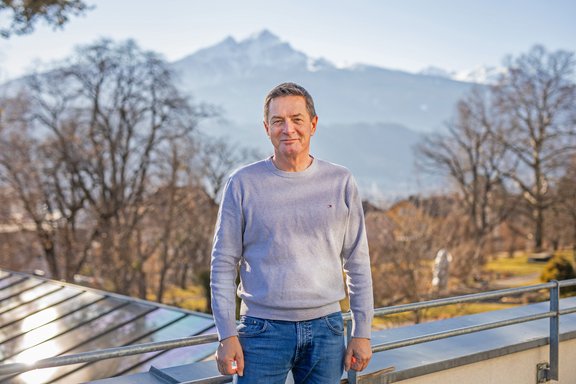Gilbert Neuner

Research Group Stressphysiology
Research group leader
Room number 206B
“Abiotic stresses are major factors that determine the natural geographic distribution of plants and limit agricultural production. My research interests focus on the mechanisms that plants have evolved to achieve resistance against abiotic stresses. Understanding these mechanisms can provide useful information for improvement of crop performance. My research is a comparative ecophysiology based on the functional biodiversity of species found in the alpine region and focuses on frost stress, ice management and the survival of heat and drought events. I has supervised over 60 Master and PhD students and I am deputy head of the research center “Ecology of the Alpine Region” and the doctoral program “Alpine Biology and Global Change.”
Projects
- The low temperature limit of tree xylem, FWF Project PAT 7612223, 2024-2028
- Predetermined spaces of ice accumulation in plant tissues, FWF Project 34844-B, 2021-2025
- Plant water use under heat, FWF Project 34717-B, 2021-2025
- Disentangling evolutionary adaptation from transient acclimation to alpine environments in Arabidopsis arenosa, FWF Project 31027-BB2, 2018-2023
- Ice management and freeze dehydration of plant cells, FWF Project 30139-B32, 2018-2021
Selected Publications
- Neuner, G. and Buchner, O. 2023 The dose makes the poison: The longer the heat lasts, the lower the temperature for functional impairment and damage. Environmental and Experimental Botany, 212, 105395. DOI: 10.1016/j.envexpbot.2023.105395
- Stegner, M., Buchner, O., Geßlbauer, M., Lindner, J., Flörl, A., Xiao N., Holzinger A., Gierlinger, N., Neuner, G. 2023 Frozen mountain pine needles: The endodermis discriminates between the ice-containing central tissue and the ice-free fully functional mesophyll. Physiologia Plantarum, 175:e13865. DOI: 10.1111/ppl.13865
- Neuner, G., Kreische, B., Kaplenig, D., Monitzer, K., Miller, R. 2019. Deep supercooling enabled by surface impregnation with lipophilic substances explains the survival of overwintering buds at extreme freezing. Plant Cell Environ, 42, 2065-2074. DOI:10.1111/pce.13545
- Neuner, G., Monitzer, K., Kaplenig, D., Ingruber, J. 2019. Frost Survival Mechanism of Vegetative Buds in Temperate Trees: Deep Supercooling and Extraorgan Freezing vs. Ice Tolerance. Front Plant Sci 10: 537. DOI: 10.3389/fpls.2019.00537
- Kuprian, E., Munkler, C., Resnyak, A., Zimmermann, S., Tuong, T. D., Gierlinger, N., Müller, T., Livingston III, D. P., Neuner, G. 2017. Complex bud architecture and cell-specific chemical patterns enable supercooling of Picea abies bud primordia. Plant Cell Environ, 40, 3101-3112. DOI: 10.1111/pce.13078
All Publications ORCID Research Gate Google Scholar CV Gilbert Neuner
Additional research achievements
Community services
- Editorial board memeber/Reviewer – journals and fundign agencies
- Deputy head of the research center “Ecology of the Alpine Region”
- Deputy head of the doctoral program “Alpine Biology and Global Change“
Teaching
- Stress physiology
- Physiological plant ecology
- Plant physiology
- Botanical experiments for application in school
- Functional Biology of Alpine Plants
